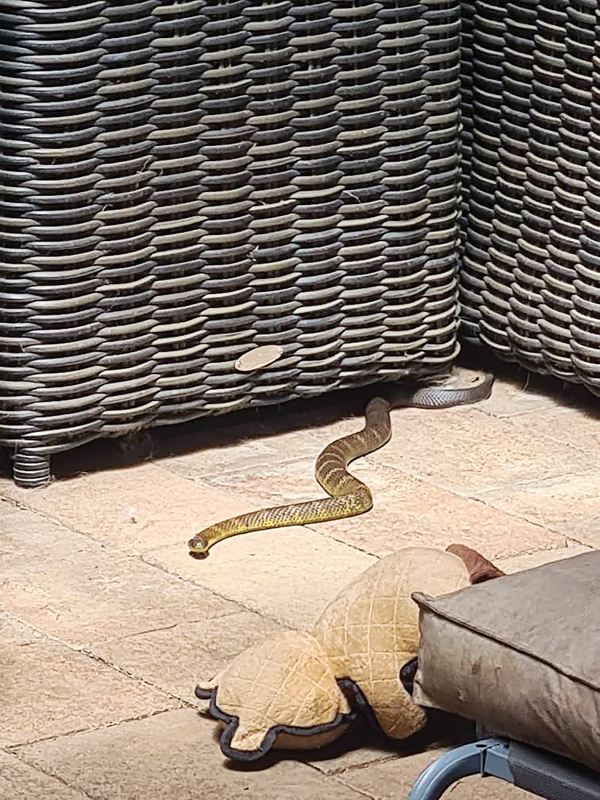
ANIMAL rescuer Nigel Williamson faces some pretty hairy situations in his daily work that would make even the bravest among us tremble with trepidation.
But when it comes to helping pooches, possums and pelicans – and everything in between – the 37-year veteran of animal rescue wouldn’t have it any other way.
“Yes, it can be a little dangerous and I’ve been in some tricky situations, but it’s not about me at all, it’s about the animals,” he said.
“Sometimes I’m left scratching my head trying to work out how to get to a trapped or displaced animal, but I’ve never walked away from one yet.”
After starting his animal rescue career with the RSPCA in the 1980s, Williamson branched out on his own after five years when the organisation decided to scale down its workforce.
He may not have a cape or a mask, but under the banner of Nigel’s Animal Rescue he performs feats usually associated with superheroes. Armed with an array of specialist equipment and extensive hands-on knowledge of animal welfare and behaviour, Williamson is regularly called on by vets, government organisations, private businesses and individuals to deal with trapped, injured, displaced or lost animals.
He has even gained an international profile thanks to media coverage of his rescue, with television appearances and YouTube videos shared around the world.
Williamson, based at Cannons Creek, estimates he has retrieved tens of thousands of birds and possums from roof spaces, wood heater flues and walls, along with hundreds of cats and other animals stuck in equally squishy places or at the top of 40 metre-plus trees.
Some jobs can take hours, even days, of patience and care so animals are retrieved uninjured. Some involve the sad retrieval of dead wildlife or pets, while others can be a matter of simply giving some advice over the phone.
Travelling all over Melbourne, and often around Victoria, Williamson drives hundreds of kilometres a day to help distressed pet owners or members of the public, answering all calls – no matter how unusual – with his trademark calm and considered approach, and diplomacy.
“I recently took a call that sounded very bizarre, a bird stuck in the ceiling of a roof that the caller could can hear at night and throughout the day,” he said.
“This didn’t sound right. I told him to go and check the smoke detectors in his house, turned out to be flat batteries – not the first time I’ve had a call like this.”
Others take more time to solve, as well as some gentle persuasion and a tactical approach.
“I remember a property owner who had spent a lot of money on landscaping and trees, and over time had trapped dozens of possums that had been eating them,” he said.
“I explained that removing the possums wasn’t the answer as others would quickly move in and replace them and it would be ongoing, but he wouldn’t listen and simply wanted them gone.
“His problem persisted so, after some more convincing, he allowed me to put up a possum box in the garden and as soon as a possum took up residence all the others possums stayed away and kept out of his territory. The owner even agreed to leave some food out occasionally for that possum – problem solved, trees protected, and nothing hurt.”
Williamson says one of the driving forces that keeps him in animal rescue is animal welfare, particularly when it comes to wildlife, and the chance to use that platform to advocate for the voiceless.
In a way, that drive also protects him from burnout and the stress of being continually confronted with horrific scenes of animal suffering.
Even simple education, like getting people to put wire covers on chimney openings and end caps on roller doors, would go a long way to reducing animal suffering.
Although he runs an animal rescue business, much of the work he ends up doing barely pays, if at all. And then there’s his volunteer wildlife work. Williamson has become a strong voice for wildlife volunteers, and spends his rare spare time volunteering with Warriors4Wildlife, a charity dedicated to the rescue and transport of sick, injured, orphaned or abandoned wildlife.
He is the group’s vice-president and believes everyone has a role to play in protecting Australia’s native animals, whether by advocacy, kindness or direct action.
“Every job I do is different and requires an individual approach, but the best part of it all is helping wildlife and getting the opportunity to advocate for wildlife and educate the public,” he said.
“When I started, I guess some of the things I saw really shook me, but I can’t let it get to me, or I couldn’t do this job.
“We are so lucky to actually have wildlife in this country, so many countries literally have none left, so we need to do what we can to protect it.”